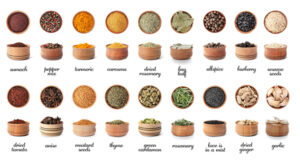Bitter Herbs: Significance, Uses, and Biblical Importance Bitter herbs have a rich history and hold significant cultural, culinary, and medicinal importance. From their crucial role in Passover traditions to their mention in the Bible, these herbs are revered for their distinctive flavors and health benefits. This article delves into what bitter herbs are, their […]
The Fascinating World of Herb Names
The Fascinating World of Herb Names
Herbs have been an integral part of human history, utilized for their culinary, medicinal, and aromatic properties. The names of these herbs often carry fascinating histories, cultural significances, and etymological roots. This article delves into the origins and meanings of various herb names, providing insights into their historical contexts and highlighting notable books for those interested in further exploration.
Historical and Cultural Roots
Herb names are a testament to the rich tapestry of human culture and history. Many herbs have names derived from ancient languages, reflecting their long-standing importance in different societies. For example, basil comes from the Greek word “basileus,” meaning “king,” hinting at its revered status in ancient cultures. Basil was believed to have been used in royal rituals and was considered a symbol of love and protection.
Similarly, rosemary, a herb synonymous with remembrance and fidelity, derives its name from the Latin words “ros” (dew) and “marinus” (sea), meaning “dew of the sea.” This name reflects the herb’s Mediterranean origins, where it often grows near the coast. Rosemary has been used in various traditions and rituals, symbolizing memory and loyalty.
Etymological Mysteries
Some herb names have intriguing etymological backgrounds that reveal their uses and characteristics. Sage, for instance, comes from the Latin “salvia,” which is derived from “salvare,” meaning “to save” or “to heal.” This name underscores the herb’s historical use as a healing plant. Sage was highly valued in ancient medicine for its supposed ability to prolong life and improve mental clarity.
Another example is thyme, whose name comes from the Greek word “thymos,” meaning “courage.” In ancient Greece, thyme was associated with bravery and was often used in baths and burnt as incense to promote strength and courage. Its association with bravery continues today, as it is commonly used in aromatherapy for its invigorating scent.
Common Herbs and Their Meanings
Let’s take a closer look at some common herbs and the meanings behind their names:
- Parsley: The name “parsley” comes from the Greek word “petroselinon,” meaning “rock celery,” as it often grows on rocky hillsides. It symbolizes festivity and joy.
- Mint: Named after Minthe, a nymph in Greek mythology, mint is associated with hospitality and warmth. Its name signifies refreshment and energy.
- Dill: The name “dill” is derived from the Old Norse word “dilla,” meaning “to lull,” reflecting its historical use as a remedy for colic and insomnia.
- Oregano: From the Greek “origanon,” which combines “oros” (mountain) and “ganos” (joy), oregano means “joy of the mountain.” It is associated with happiness and health.
- Cilantro: Known as coriander in many parts of the world, the name “cilantro” comes from the Greek “koris,” meaning “bug,” due to the plant’s strong scent.
Notable Books on Herb Names and Their Histories
For those intrigued by the rich history and meanings behind herb names, several books offer detailed explorations into this fascinating subject. Here are a few notable recommendations:
- “The Complete Book of Herbs: A Practical Guide to Growing and Using Herbs” by Lesley Bremness – This comprehensive guide covers the cultivation and uses of herbs, including historical and cultural insights into their names and meanings.
- “Herbs: The Magic Healers” by Paul Twitchell – This book delves into the healing properties of herbs and includes sections on the etymology and historical significance of various herb names.
- “Culpeper’s Complete Herbal” by Nicholas Culpeper – A classic work in herbal literature, Culpeper’s book provides detailed descriptions of herbs, their names, and their medicinal uses, offering a historical perspective on herbal medicine.
- “Rodale’s Illustrated Encyclopedia of Herbs” by Claire Kowalchik and William H. Hylton – This encyclopedia offers an extensive look at the history, folklore, and uses of herbs, including the origins and meanings of their names.
- “The Herbalist’s Bible: John Parkinson’s Lost Classic Rediscovered” by Julie Bruton-Seal and Matthew Seal – This modern adaptation of Parkinson’s 17th-century work includes insights into the historical names and uses of herbs, bridging the past and present of herbal knowledge.
Herb names are more than mere labels; they are windows into the past, offering glimpses into the cultural, historical, and etymological richness of our botanical heritage. Understanding the origins and meanings of these names deepens our appreciation for the herbs we use in our daily lives, whether in the kitchen, garden, or medicine cabinet. By exploring the fascinating world of herb names and delving into notable books on the subject, we can connect more profoundly with the natural world and its timeless wisdom.







